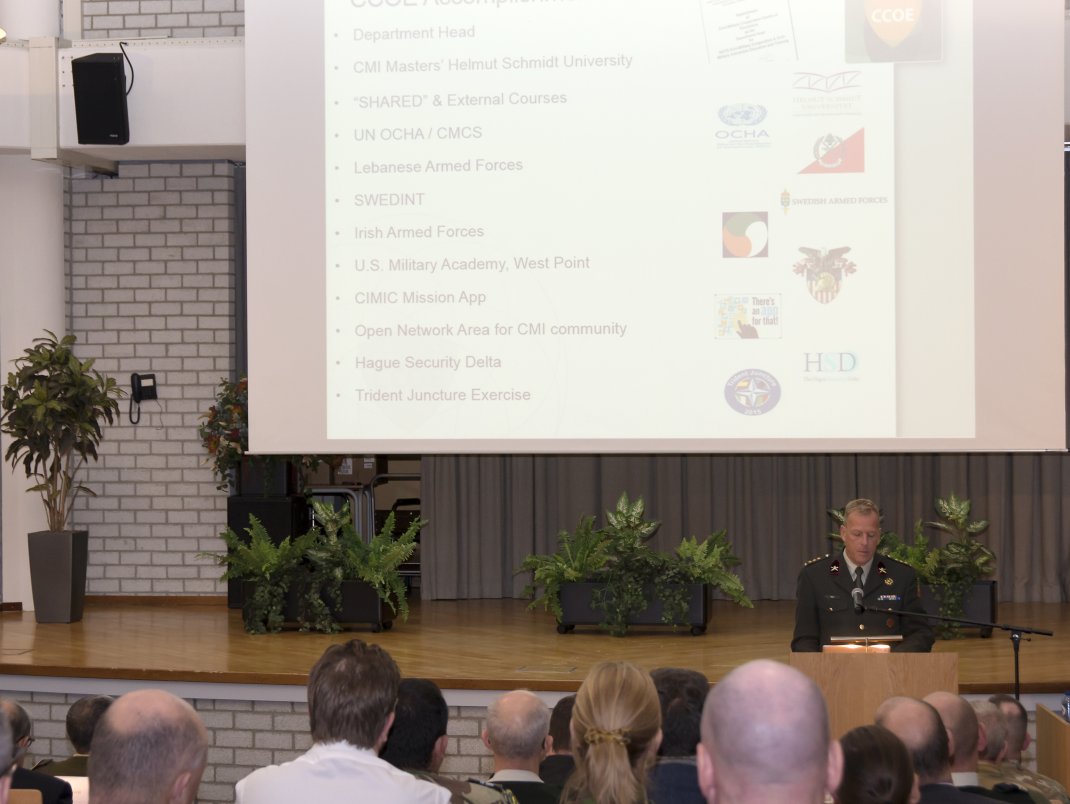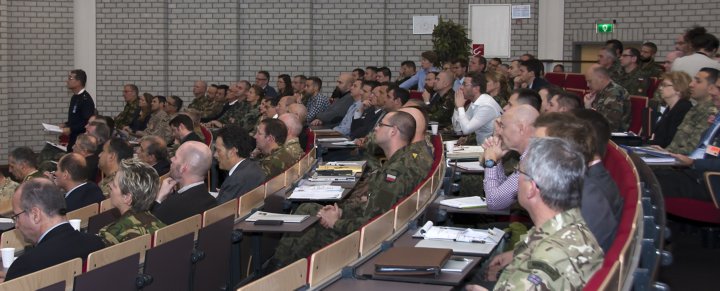“HOW MUCH TIME DO WE HAVE LEFT?” – SHAPING FUTURE CIVIL-MILITARY INTERACTION
In order to achieve a broad consensus on how to operationalize the Military Committee (MC) Policy on CIMIC and CMI, Supreme Headquarters Allied Powers Europe (SHAPE) and the CCOE are conducting the Civil-Military Interaction (CMI) workshop at The Hague. The CMI operationalization of NATO policies will pave the way ahead for effective CMI in developing and future stabilization scenarios. Over 100 participants from 17 nations are gathering from 23 to 25 November 2015 at the CCOE.
The director of the CCOE draws the arch from the last twenty years of CIMIC through current events into the future of cooperation and interaction in complex crisis situations and issues of humanitarian relief. See the opening remarks of Colonel Roel Been below.
 Picture: CCOE Director Colonel Roel Been welcomes the audience/ Source: CCOE/ Dube
Picture: CCOE Director Colonel Roel Been welcomes the audience/ Source: CCOE/ Dube
Opening Address, CMI Workshop, 23 November 2015
Colonel Roel Been, Director CCOE
“Good morning! I am Colonel Roel Been, the proud director of the CIMIC Centre of Excellence. In order to introduce the wide world of stakeholders to CIMIC, CMI and the CCOE, we produced a short and sharp video as part of our engagement activities. Just to explain what we do, why we do it and what it might bring. So now, even my family, friends, neighbours as well as my daughter all do understand what I’m doing at work. I hope you do now!
Dear General van Loon, Dear Admiral Bigot, Dear Mr. Ryan. Distinguished guests, workshop participants, dear friends!
It is my distinct pleasure to welcome you here at the home of the CIMIC COE in The Hague. While many of you have been here in the past, for example at our Community of Interest Workshop this February, for some this will be the first visit to these premises. A warm welcome to all of you!
Before now giving you an overview into the key developments at the CCOE during the last months since, I am very delighted to introduce to you to the three distinguished ambassadors of the CMI WS, who will have a key role during the coming proceedings.
I am very pleased to introduce Mr. Michael C. Ryan, (the Jack Ryan of CMI, if you follow Tom Clancy novels), the Director, ECJ-9, at Headquarters U.S. EUCOM in Stuttgart. He will serve as the director of this work shop. In Stuttgart, he is in charge of integrating: interagency, academia, nongovernmental, international organizations and private sector partners. This is done with the goal to better execute the US EUCOM’s mission; to sustain strategic partnerships and to support enduring peace and stability in Europe through a “Whole of Society” approach. Michael Ryan joined the Senior Executive Service of the US Department of Defense in 2007, following a 25-year career in the US Air Force, having retired as a Colonel. Michael, thank you for taking up leadership of this important workshop.
Seated next to him, please welcome our good old friend Lieutenant General Ton van Loon, now retired, who is one of the most prominent veterans of Dutch-German military cooperation and inter-operability. Since 1995, when he joined the I. German / Netherland Corps for the first time as a staff officer, General van Loon, successfully completed several key assignments in the international and bi-national context, leading him to Kosovo as battalion commander with KFOR and as commander of RC South to Kandahar in Afghanistan with ISAF, now already as a Major General. In April, 2010 he was promoted to Lieutenant General ahead of his assignment to the I. German/Netherland Corps as Corps Commander. Upon his retirement from active duty he was awarded by Germany with the Grand Merit Cross with Star Order of Merit of the Federal Republic of Germany and he was promoted to Officer in the Order of Orange-Nassau with swords. As senior advisor to NATO and NATO nations, and to the CCOE, he is providing his broad experience on the Comprehensive Approach to the Directorate and to this workshop. Mr. Comprehensive Approach, dear Ton, a warm welcome and great to see you again!
Rear-Admiral Denis Bigot, is the new ACOS J9 at SHAPE. He joined the French Naval Academy in 1978. Following the War College from 95/96, he was appointed to the « operations» division of the naval staff in Paris, in charge of amphibious and naval aviation. Admiral Bigot is an aviation helicopter pilot.
After commanding the naval aviation training school, he joined the training and education branch in the French Navy and was chief of the J3 maritime branch in Lisbon. In 2011, he became sub-director “competences” and three years later he joined the French National Military Representative in Mons (Belgium).
In September this year, when promoted to Rear-Admiral, he became the J9 Assistant of the Chief of Staff of SACEUR. Admiral, I’m very happy for the opportunity to host this Workshop in The Hague in the timeframe of your traditional annual ACO J-9 workshop. Thanks Denis!
Our move from our previous home in Enschede, has been much more than just a move to a new office in another city. The close proximity of more and less 200 government organizations, IOs and NGOs has brought in an additional new outlook. And also perspective on the scope and opportunities of the CCOE and its contribution to a common understanding and applications of CIMIC and CMI. Here we can meet the ‘others’ before we need them in missions.
In the fairly short time span, since between the Community of Interest Workshop in early February, the CCOE has seen a large number of development and events, some directly related to moving door-to-door with key governmental and international organizations. Presenting the CCOE’s VISION 2020 to many of you earlier this year was a true foreboding for the events to come. We feel perfectly at home in The Hague, as it is the international city of peace, justice and security. And the only Dutch city with a beautiful 10 miles beach and everything that comes with it!
While many of you, and our doctrine team, were busily preparing, completing and evaluating the CMI survey, which is the basis of this workshop, the CCOE overall has seen a key number of CMI activities, visits, guests, exercises and acknowledgements:
In this context most prominently featured is the official granting of the status of Department Head (DH) for the Civil-Military Cooperation (CIMIC) and Civil-Military Interaction (CMI) discipline within NATO. As Department Head, the CCOE supports HQ SACT’s responsibility for translating NATO Education & Training requirements into solutions for the individual and collective training spectrum. Acting as DH means that the CCOE has sufficient expertise in the CIMIC and CMI discipline to manage training solutions and take part in the quality assurance processes.
But also the academic “Master of CMI” program, which we have developed together with the Helmut-Schmidt-University in Hamburg, has marked a significant step ahead in the training and standardization of CMI. This study program represents a unique cooperation aiming to align military education & training with civilian ‘Bologna’ educational standards.
Along the same lines we have been most fortunate to jointly deliver the first UN course “Supporting Humanitarian Action in Responding to Emergencies and Disasters (the SHARED course)”. And in full cooperation with UN OCHA. It is the aim of the SHARED course “to improve the effectiveness of humanitarian action in natural disasters and complex emergencies, where military forces are present. So providing military personnel with the right knowledge and understanding to enable them to provide the right support, to the right people, at the right time and in the most appropriate way.” This won’t be the last iteration!
Mr. Josef Reiterer, the chief of the UN OCHA’s Civil-Military Coordination Section also visited this summer and delivered from the CCOE a webinar on the future of CMI to a live online audience from across Europe and beyond.
We also deepened its external CMI engagement network commencing relationships with the Irish Command and Staff School and the UN Training Center there, the Swedish Armed Forces International Center (SWEDINT), with the Lebanese Armed Forces, the International Federation of Reserve Officers, the US Military Academy at West Point and many more. So we also do focus beyond NATO and NATO nations.
Beyond our in-house course and training schedule, the CCOE also conducted several external CMI and CIMIC satellite courses in Italy, Poland, Turkey, Croatia, Hungary and Germany.
The CIMIC App, developed at the CCOE, which shall enable civilian and military actors alike, to draw on the same essential project information crisis areas. The CIMIC App has been successfully tested in the Beta phase. Together with external stakeholders, we are now in the process to technically operationalize the CIMIC App on a universal scale and I expect further progress with this in the coming year. The App is already down loadable from the google store.
On the civilian side, we signed a memorandum of understanding with the “Hague Security Delta”, one of the largest networks of security oriented organizations in business, government and knowledge institutions in Europe. This Security Delta aligns innovations and knowledge in the field of cyber security, national and urban security, protection of critical infrastructure, and forensics.
In concluding this overview, I would like to mention the CCOEs contribution to the recently finished NATO’s showcase exercise Trident Juncture as Officer Directing the Exercise. We’ll hear more about this during the VTC with Admiral Gonzales Huix, the Joint Forces Trainer, ACT, this evening during the ice breaker.
Please allow me now a few minutes to outline, why, and in addition to all the other developments at the CCOE, this CMI WS still is the most important event for us this year: and why we have committed a significant part of our personnel and resources to this CMI workshop for the better part of the last eight months. So why?
First of all, it is because you are all here!
Secondly, we are again in a time of significant change and challenge to which we needs to prepare the proper answers and in due time.
And hardly any other incident could proof this point more, than the barbarian attacks in Paris during the week before and the ensuing developments in the next months and years. During a small ceremony with all my staff and students at the CCOE this past Monday, I asked for one minute of silence. Before that, I highlighted the key tenants of the Charter of the United Nations by which we all abide. It expresses:
“… to save succeeding generations from the scourge of war,…
… to reaffirm faith in fundamental human right, in the dignity and worth of the human person, in the equal rights of men and women and of all nations….
… to establish conditions under which justice and respect for the obligations and sources of international law can be maintained, …”
in order to:
“… practice tolerance and live together in peace with one another … and
… to unite our strength to maintain international peace and security, and
… to employ international machinery for the promotion of the economic and social advancement of all people.”
Seventy years after their proclamation, these fundamentals are still standing strong as our motivation in order to gain peace. Not only by the use of weapons, but also by the use of words, debate, money and tolerance. And by creating shock resistant partnerships between the military and the relevant civilians.
These terrorists are trying to take their fight to our borders and into our societies. In the end, they will be defeated in their territory and by their inability to provide either a viable future or sustenance for the people under their oppressive rule. Without wanting to predict the circumstances at this time, there will be, however, large and extended tasks for the international community to assist these devastated regions and societies in their return to civil authority and the rule of law.
Taking a somewhat historic perspective, we need to realize that going into the major deployment scenarios of the last two decades, post-Yugoslavia and Afghanistan, CMI and CMI was mostly an afterthought after presence in country had already been established and operations were already under way. Every time tactical, operational and strategic CMI activities had to be implemented after serious and lasting frictions between Military and civilian actors in the area.
Now at this moment my dear friends, we are on the verge of newly and further developing crisis situations in the Eastern Ukraine, the Middle East and Northern and Central Africa – all along the borders of the Alliance.
Now at this moment dear friends, there is the key opportunity to become effective ahead of the wave! To shape related NATO policies and their implementation before, and not after our Forces deploy into theatre. This way, CIMIC will be able to influence the operational landscape from the beginning. And enabling a much more fruitful and successful outcome of the overall operation in the interest of our soldiers and the affected civilian population.
Now at this moment dear friends, after we have taken time to conduct and analyze the CMI survey from 66 stakeholders at eight institutions, we will take further time to fully operationalize this new NATO policy. In this CMI Workshop!
Let me ask all of you: How much time do we have left? In the current global environment, we might get tasked very soon and very fast. At that point at time, we need to be ready to respond comprehensively to the quickly emerging complex crisis situations. I think that we are running out of time!
Bearing this overall task in mind, I would like to challenge all of us to apply the key tenants of the CCOEs’ Vision 2020 to our work during the next days:
- to connect with each other in plenary and during the syndicate work, and
- to share all new, creative and relevant information, in order
- to contribute to a common understanding of CIMIC and CMI before, during and after future missions.
General, Admiral, Sirs, ladies and gentlemen, dear friends, let’s get to work. Let us create a part of our professional future and the future of our children. Let’s get ready folks! Ready to protect our peoples, our values our territory and our future! Let us nail this task together!
Without further ado, I will now ask Admiral Denis Bigot to weigh on the operational aspects of shaping policies through this unique workshop.
Thank you very much for your attention!”

